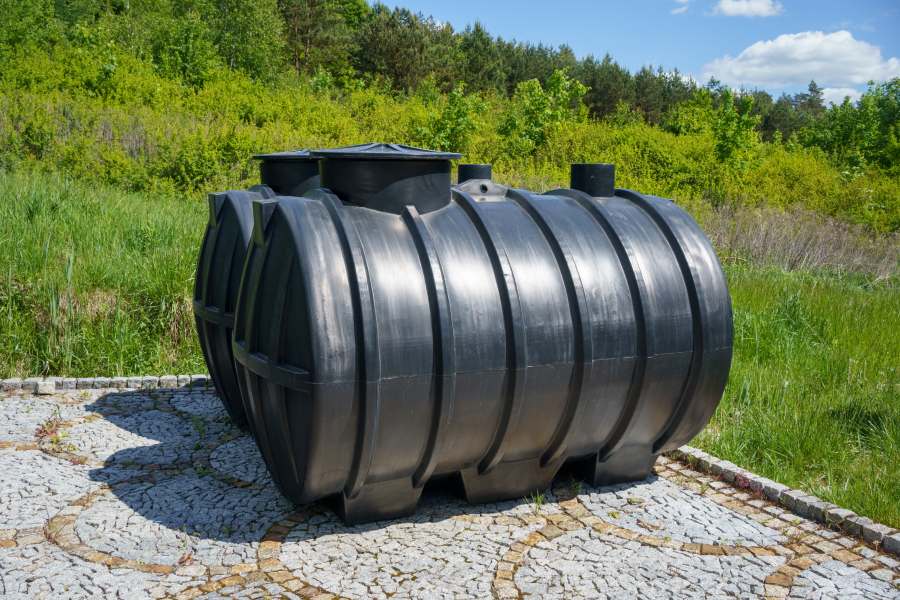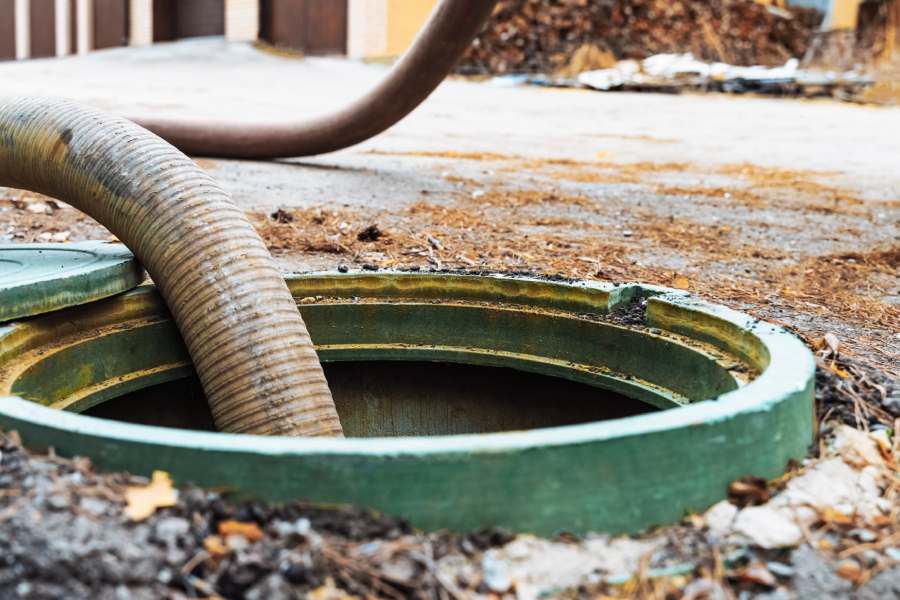A septic tank is one of those unseen essentials that quietly keeps a household running smoothly, managing waste without much fanfare. But, like all things, it doesn’t last forever. How long does a septic tank last?
Septic tank durability depends on several factors, and we’ll explore the various elements that affect a septic tank’s lifespan. We’ll discuss signs that your system may be nearing the end of its service and also cover the steps you can take to maximize its efficiency and longevity.
Let’s dive in and discover how long can a septic tank last!

How Long Does a Septic Tank Last?
The lifespan of a septic tank can vary widely, typically ranging from 15 to 40 years or even longer, depending on several factors. The durability of a septic tank largely depends on its material (concrete, fiberglass, plastic, or steel), the quality of its installation, the surrounding soil conditions, and the regularity of its maintenance.
We must emphasize that regular pumping and maintenance are crucial for extending a septic tank’s life. Proper use, such as avoiding non-biodegradable materials and managing water flow, can also help your septic system function effectively for as long as possible.
Factors Affecting Septic Tank Lifespan
Tank Material
As mentioned, the material of your septic tank plays a crucial role in determining its lifespan. There are notable differences in durability between concrete, fiberglass, plastic, and steel tanks.
Concrete tanks are known for longevity, often lasting 40 years or more if properly maintained. Fiberglass and plastic tanks usually last around 30 to 40 years but are susceptible to damage from soil shifts or excessive pressure. Steel tanks, while the least durable, might only last 15 to 20 years due to their tendency to rust over time.
Installation quality
The quality of installation plays a crucial role in determining the longevity of your septic system. It is essential to ensure that your septic tank is installed by licensed professionals like ours who are well-versed in local codes and best practices.
Proper installation guarantees that the tank is positioned correctly, preventing issues such as shifting or settling and ensuring that pipe connections are made accurately. Moreover, our professional installers can offer guidance on selecting the most suitable tank type for your specific area.
Soil conditions and drainage
The type of soil and drainage conditions on your property are crucial in the performance and longevity of your septic system. Each soil type affects the system’s functionality differently.
Sandy soil, for instance, drains efficiently but may not effectively filter contaminants. Conversely, clay soil can create drainage issues. The best soil for a septic system strikes a balance between sand and clay, ensuring effective filtration and proper drainage.
Frequency of maintenance and pumping
Regular maintenance and pumping are crucial for extending the lifespan of your septic tank, as they help prevent minor issues from evolving into major problems. Consistent upkeep, including annual inspections, ensures that leaks, cracks, and overall function should be addressed promptly.
Cleaning baffles and filters is also necessary to prevent solids from entering the drain field, which can otherwise lead to serious complications. By detecting and repairing issues early, you can avoid the high costs and complexity associated with major system failures.
Signs of Septic Tank Aging and Failure
Common signs of aging
Septic tanks frequently exhibit signs of wear and potential failure as they age. A common indicator is slow drainage in sinks and toilets. You may observe that water takes longer to drain from sinks and showers or that toilets need multiple flushes.
These issues usually begin gradually but can worsen over time, potentially signaling problems within the tank or drain field. While a single slow drain may be due to a minor clog, multiple slow drains often suggest a more serious septic system issue.
Structural degradation
Septic tanks inevitably undergo structural degradation due to age-related wear, corrosion, and settling. Over time, all types of septic tanks naturally deteriorate.
Concrete tanks may develop cracks or chips, metal tanks can rust or corrode, and plastic tanks might become brittle or warp. The wear and tear weaken the tank’s structure, which can lead to leaks or even collapses.
Factors such as the tank’s material, soil conditions, and usage patterns influence the degradation rate. So, regular inspections are essential for detecting issues early and mitigating potential problems.
Maintenance Tips to Extend Lifespan
Regular pumping
Regular pumping is crucial to septic tank maintenance, significantly extending its lifespan. To ensure optimal performance, it’s important to schedule routine tank pumping every 3 to 5 years. However, this interval can vary based on tank size and household use.
Larger families might require more frequent pumping, while smaller households may extend the period between services. Adhering to a regular pumping schedule is key to preventing many common septic system problems. It is also an essential part of responsible system ownership.

Effluent filter maintenance
Effluent filter maintenance is another critical aspect of septic system care. These filters are essential for keeping solids out of the drain field and require regular cleaning and occasional replacement. The frequency of cleaning can vary; some filters need annual maintenance, while others may require attention less often.
A well-maintained filter ensures that water flows freely, preventing backups and reducing the risk of system overload. Over time, filters can deteriorate and need to be replaced over time, usually every few years. And common indicators that a filter needs replacement include frequent clogs or slow drainage.
Tank inspections
Regular inspections of septic tanks by qualified professionals are essential for maintaining the system’s health and longevity. Our experts identify and address potential issues early, helping you avoid costly repairs.
While we recommend annual inspections, the frequency can vary depending on the system’s age and type. Older systems, for instance, may require more frequent checks, whereas newer systems might need less frequent attention.
Environmental and Usage Considerations
Water usage
Excessive water usage can put a significant strain on a septic system, potentially leading to incomplete waste treatment and drain field clogs. This added pressure can hasten system failure, necessitating frequent repairs and shortening its lifespan. Indicators of an overwhelmed system include wet spots, gurgling sounds, slow drains, and unpleasant odors.
To extend the life of your septic tank, we advise you to practice water conservation by promptly fixing leaks, using water-efficient appliances, and distributing water use throughout the day. These measures help preserve your septic system, lower water bills, and reduce environmental impact.
Chemical usage
Harsh chemicals can severely affect the bacteria and components in your septic tank, disrupting the natural waste breakdown process. This interference not only leads to corrosion that can cause leaks but also results in costly repairs. These chemicals may also contaminate groundwater, creating both environmental and health hazards.
To protect your septic system and maintain its efficiency, it’s important to use products that are safe for septic systems. Natural cleaners like vinegar and baking soda are excellent alternatives to harsh chemicals.
Choosing biodegradable soaps and avoiding unnecessary septic tank additives will further help preserve the system’s health. By making these mindful choices, you ensure the longevity and effectiveness of your septic system, ultimately saving on repairs and safeguarding the environment.
Conclusion
So, how long does a septic tank last? Its lifespan can vary widely, typically ranging from 15 to 40 years, depending on factors like material, installation quality, and maintenance. Concrete tanks often last the longest, while steel tanks are the least durable.
As pointed out, regular maintenance, including pumping and inspections, is crucial for extending the life of your septic system. Moreover, early signs of aging, such as slow drainage and foul odors, can indicate potential issues that need addressing.
By staying proactive with these practices, you can ensure your septic system remains reliable and effective. For more tips on maintaining your septic system or to schedule a professional inspection, contact us today to keep your system in optimal condition!
